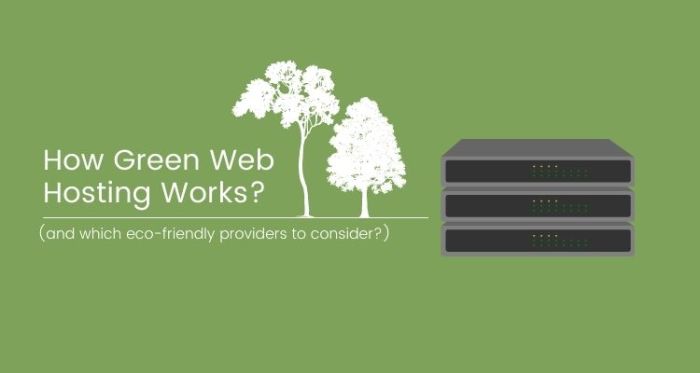Top Green Web Hosting Providers for an Eco-Friendly Website sets the stage for this enthralling narrative, offering readers a glimpse into a story that is rich in detail and brimming with originality from the outset. In an era marked by growing environmental concerns, the digital world is not immune to the need for sustainable practices. Traditional web hosting, with its reliance on energy-intensive data centers, has a significant environmental footprint.
This is where green web hosting emerges as a beacon of hope, offering a way to minimize the digital impact on our planet.
Green web hosting providers prioritize sustainability by using renewable energy sources, implementing energy-efficient practices, and engaging in carbon offsetting initiatives. These providers strive to reduce their carbon footprint and contribute to a greener future. By choosing a green web hosting provider, individuals and businesses can align their online presence with their commitment to environmental responsibility.
The Importance of Eco-Friendly Web Hosting: Top Green Web Hosting Providers For An Eco-Friendly Website

The internet is a powerful tool that connects people across the globe, but it also comes with an environmental cost. Traditional web hosting relies heavily on data centers that consume vast amounts of energy, contributing to greenhouse gas emissions and climate change. Choosing a green web hosting provider is an essential step towards reducing our digital footprint and building a sustainable future.
Benefits of Choosing a Green Web Hosting Provider
Switching to a green web hosting provider offers numerous benefits, not only for the environment but also for your website and business. Here are some key advantages:
- Reduced Carbon Footprint: Green web hosting providers utilize renewable energy sources like solar and wind power to power their data centers, significantly reducing their carbon footprint. This helps to mitigate the impact of your website on the environment.
- Enhanced Sustainability: Green hosting providers often implement energy-efficient practices, such as using energy-saving hardware and optimizing server configurations to minimize energy consumption. This commitment to sustainability aligns with your brand values and demonstrates your responsibility towards the planet.
- Improved Website Performance: By utilizing efficient infrastructure and optimized server configurations, green hosting providers can often deliver faster loading times and better website performance. This can enhance user experience and improve your website’s search engine ranking.
- Positive Brand Image: Choosing a green web hosting provider signals to your customers that you are committed to environmental responsibility. This can enhance your brand image and attract environmentally conscious consumers who value sustainability.
Key Features of Green Web Hosting Providers
Choosing a green web hosting provider is a conscious decision to minimize your website’s environmental impact. These providers prioritize sustainability by implementing various eco-friendly practices.
Renewable Energy Sources
Green web hosting providers leverage renewable energy sources, such as solar and wind power, to power their data centers. This reduces their reliance on fossil fuels, minimizing carbon emissions. For example, some providers have partnered with renewable energy companies to purchase energy credits from wind farms or solar arrays. This ensures that the electricity used to power their servers comes from clean and sustainable sources.
Energy Efficiency Practices
Green web hosting providers prioritize energy efficiency in their data centers by employing various practices. These include:
- Using energy-efficient servers and hardware that consume less power.
- Optimizing server utilization and workload management to minimize energy consumption.
- Implementing cooling systems that use natural ventilation or energy-efficient air conditioning.
- Employing server virtualization technologies to consolidate workloads and reduce the number of physical servers needed.
These practices significantly reduce energy consumption and carbon footprint, contributing to a greener web hosting environment.
Carbon Offsetting Initiatives
Green web hosting providers often engage in carbon offsetting initiatives to compensate for the emissions they cannot eliminate. They invest in projects that reduce greenhouse gas emissions, such as planting trees, supporting renewable energy projects, or promoting energy efficiency in developing countries.
Environmental Certifications
Green web hosting providers may obtain environmental certifications to demonstrate their commitment to sustainability. Some of the most common certifications include:
- LEED (Leadership in Energy and Environmental Design): This certification focuses on sustainable building design and construction, including energy efficiency, water conservation, and waste reduction.
- ISO 14001: This international standard specifies requirements for an environmental management system to help organizations improve their environmental performance.
- Energy Star: This program promotes energy efficiency in various products and services, including data centers. It helps businesses reduce their energy consumption and carbon footprint.
These certifications provide independent verification of a provider’s commitment to environmental sustainability.
Top Green Web Hosting Providers

Choosing a green web hosting provider is a great way to reduce your website’s environmental impact and contribute to a more sustainable future. Several reputable providers offer eco-friendly solutions, powered by renewable energy sources and implementing carbon offsetting practices. This section will provide an overview of some of the top green web hosting providers, highlighting their strengths and weaknesses to help you make an informed decision.
Top Green Web Hosting Providers
Here is a table comparing some of the top green web hosting providers:
| Provider Name | Renewable Energy | Carbon Offset | Certifications | Pricing | Features |
|---|---|---|---|---|---|
| GreenGeeks | Uses 300% renewable energy, more than their energy consumption | Partners with the American Forest Foundation to plant trees | Not explicitly stated | Starts at $2.95/month | Shared, VPS, and dedicated hosting plans, free website migration, free SSL certificate, 30-day money-back guarantee |
| HostGreen | Powered by 100% wind energy | Offsets carbon emissions through renewable energy projects | Not explicitly stated | Starts at $3.95/month | Shared, VPS, and dedicated hosting plans, free website migration, free SSL certificate, 24/7 customer support |
| EcoWebHosting | Uses 100% renewable energy | Offsets carbon emissions through reforestation projects | Not explicitly stated | Starts at $3.99/month | Shared, VPS, and dedicated hosting plans, free website migration, free SSL certificate, 30-day money-back guarantee |
| A2 Hosting | Uses 100% renewable energy | Offsets carbon emissions through a partnership with Carbonfund.org | Not explicitly stated | Starts at $2.99/month | Shared, VPS, and dedicated hosting plans, free website migration, free SSL certificate, 24/7 customer support |
Here is a brief discussion of the strengths and weaknesses of each provider:
- GreenGeeks: GreenGeeks is a popular choice for its commitment to using 300% renewable energy, exceeding its energy consumption. They also offer a range of hosting plans, including shared, VPS, and dedicated options. However, their carbon offsetting practices are not as transparent as some other providers.
- HostGreen: HostGreen is another reputable green hosting provider that uses 100% wind energy. They also offset carbon emissions through renewable energy projects. However, their pricing can be slightly higher than some other providers.
- EcoWebHosting: EcoWebHosting is known for its commitment to using 100% renewable energy and offsetting carbon emissions through reforestation projects. They offer a variety of hosting plans and excellent customer support. However, their website design and user interface could be more modern.
- A2 Hosting: A2 Hosting is a well-respected hosting provider that uses 100% renewable energy and offsets carbon emissions through a partnership with Carbonfund.org. They offer fast loading speeds and excellent customer support. However, their pricing can be slightly higher than some other providers.
The best green web hosting provider for you will depend on your specific needs and requirements. Consider factors such as your budget, website traffic, and the level of support you require. If you are looking for a provider that uses a high percentage of renewable energy and offers a wide range of hosting plans, GreenGeeks is a good option.
If you are looking for a provider with a strong commitment to carbon offsetting, HostGreen is a good choice. If you are looking for a provider with excellent customer support, EcoWebHosting or A2 Hosting are both good options.
Choosing the Right Green Web Hosting Provider
Selecting the right green web hosting provider is crucial for ensuring your website’s environmental responsibility while meeting your specific needs. Several factors come into play when making this decision, and a careful evaluation process is essential.
Factors to Consider When Choosing a Green Web Hosting Provider
- Sustainability Practices: The core of green web hosting lies in the provider’s commitment to sustainable practices. Look for providers that utilize renewable energy sources, invest in energy-efficient data centers, and actively offset their carbon footprint.
- Certifications and Recognition: Reputable green web hosting providers often seek third-party certifications and recognitions that validate their sustainability claims. Some common certifications include the “Green Web Hosting” certification by the Green Web Foundation and “Energy Star” certification for energy-efficient data centers.
- Website Traffic and Storage Needs: Consider the anticipated traffic volume for your website and the amount of storage space required for your content, databases, and other files. Choose a provider that can handle your current needs and offers scalability for future growth.
- Technical Support and Reliability: Reliable technical support is crucial for ensuring website uptime and resolving any technical issues that may arise. Look for providers that offer 24/7 support channels, including phone, email, and live chat. Additionally, consider the provider’s track record for website uptime and network stability.
Evaluating Pricing Plans and Features
Understanding the pricing plans and features offered by different green web hosting providers is essential for making an informed decision.
- Pricing Structure: Green web hosting providers typically offer various pricing plans based on factors such as storage space, bandwidth, and the number of websites hosted. Compare the pricing structures of different providers and select a plan that aligns with your budget and website needs.
- Features and Resources: Evaluate the features included in each pricing plan, such as website building tools, email accounts, databases, security features, and other resources. Ensure the plan provides the necessary tools and resources for your website’s functionality and growth.
- Customer Reviews and Testimonials: Reading customer reviews and testimonials can provide valuable insights into the provider’s reputation, customer service, and overall performance. Look for reviews from other website owners who have used the provider’s services.
Building a Sustainable Website
Building a sustainable website involves optimizing your website’s performance to reduce energy consumption without compromising user experience. This approach minimizes your environmental impact and aligns with the principles of green web hosting.
Optimizing Website Performance for Energy Efficiency, Top Green Web Hosting Providers for an Eco-Friendly Website
Optimizing your website’s performance for energy efficiency is crucial for reducing your carbon footprint. A website that loads quickly and efficiently requires less energy to operate, minimizing the strain on servers and data centers.
- Minimize HTTP Requests: Each element on your website, such as images, scripts, and stylesheets, requires an HTTP request to load. Reducing the number of requests can significantly improve loading times.
- Optimize Images: Images are often the largest files on a website, contributing significantly to loading times. Compressing images without compromising quality can significantly reduce file sizes.
- Use Caching: Caching stores copies of website content on users’ devices, reducing the need to repeatedly download the same information from the server. This can dramatically improve loading times and reduce energy consumption.
- Minify Code: Minifying code removes unnecessary characters and spaces, reducing file sizes and improving loading times. This is especially effective for CSS and JavaScript files.
- Lazy Load Images: Lazy loading images loads images only when they are visible in the user’s browser window. This can significantly improve loading times for pages with many images, especially on mobile devices.
Using Lightweight Themes and Plugins
The choice of themes and plugins can significantly impact website performance. Lightweight themes and plugins are designed to be efficient, minimizing resource usage and improving loading times.
- Choose Lightweight Themes: Select themes that are optimized for speed and performance, minimizing the number of files and scripts used. Look for themes with clean code and a focus on efficiency.
- Use Essential Plugins: Limit the number of plugins you install to only those that are absolutely necessary. Each plugin adds additional code and resources to your website, potentially impacting performance.
- Regularly Update Themes and Plugins: Keeping themes and plugins up to date is crucial for security and performance. Updates often include optimizations and bug fixes that can improve efficiency.
Reducing Website File Sizes
Reducing website file sizes is crucial for improving loading times and minimizing energy consumption. This can be achieved through various optimization techniques.
- Compress HTML, CSS, and JavaScript: Compressing these files can significantly reduce their size without affecting functionality.
- Optimize Images: Compressing images using tools like TinyPNG or ImageOptim can reduce file sizes without compromising quality.
- Use Web Fonts Sparingly: Web fonts can add to file sizes. Consider using system fonts or limiting the number of web fonts used.
- Minimize External Scripts: External scripts, such as those from analytics platforms or social media, can increase loading times. Consider minimizing their use or implementing them efficiently.
The Future of Green Web Hosting

The field of green web hosting is rapidly evolving, driven by growing awareness of environmental concerns and technological advancements. This dynamic landscape presents exciting opportunities for a more sustainable digital future.
Trends and Innovations in Green Web Hosting
The future of green web hosting is characterized by several emerging trends and innovations that are shaping the industry.
- Increased Use of Renewable Energy Sources: Green web hosting providers are increasingly relying on renewable energy sources, such as solar and wind power, to power their data centers. This shift towards renewable energy is reducing their carbon footprint and promoting a more sustainable web infrastructure.
- Energy-Efficient Data Center Design: Advancements in data center design are leading to more energy-efficient facilities. These innovations include optimized cooling systems, efficient power distribution, and the use of energy-saving technologies. These advancements are significantly reducing energy consumption and carbon emissions associated with data centers.
- Cloud Computing and Green Data Centers: The adoption of cloud computing is contributing to a more sustainable web infrastructure. Cloud providers are increasingly investing in green data centers, offering energy-efficient services and promoting responsible data storage practices.
- Development of Green Web Hosting Standards: Industry initiatives are working towards establishing standardized metrics and certifications for green web hosting. These standards will provide a framework for measuring and verifying the environmental performance of web hosting providers, promoting transparency and accountability in the industry.
Predictions for Sustainable Web Infrastructure
Based on current trends and technological advancements, several predictions can be made about the future of sustainable web infrastructure.
- Widespread Adoption of Green Web Hosting: The growing awareness of climate change and the increasing demand for sustainable solutions will likely lead to a wider adoption of green web hosting practices. More businesses and individuals will choose green web hosting providers, contributing to a more environmentally friendly web infrastructure.
- Development of New Green Technologies: Continued research and development will lead to the emergence of new green technologies for web hosting. These innovations could include more efficient data storage methods, advanced energy management systems, and innovative hardware designs that minimize energy consumption.
- Integration of Green Web Hosting with Other Sustainable Practices: Green web hosting will be integrated with other sustainable practices, such as green data management and eco-friendly website design. This holistic approach will contribute to a more sustainable digital ecosystem.
As we navigate the digital landscape, it’s crucial to consider the environmental impact of our online activities. Choosing green web hosting is a proactive step towards a more sustainable future. By opting for providers who prioritize renewable energy, energy efficiency, and carbon offsetting, we can minimize our digital footprint and contribute to a healthier planet. The future of web hosting lies in embracing green practices, fostering a harmonious balance between technological advancement and environmental responsibility.
Let’s work together to create a digital world that is both innovative and sustainable.
Clarifying Questions
What are the benefits of using green web hosting?
Green web hosting offers numerous benefits, including reduced carbon emissions, support for renewable energy, and a positive impact on the environment. By choosing a green provider, you contribute to a more sustainable future and align your online presence with your environmental values.
How can I tell if a web hosting provider is truly green?
Look for providers that use renewable energy sources, have certifications like the EPA’s Energy Star, and participate in carbon offsetting programs. They should also transparently disclose their environmental practices and initiatives.
Are green web hosting providers more expensive than traditional providers?
Green web hosting providers may have slightly higher prices due to their commitment to sustainability. However, the cost difference is often minimal, and the environmental benefits outweigh the price premium.